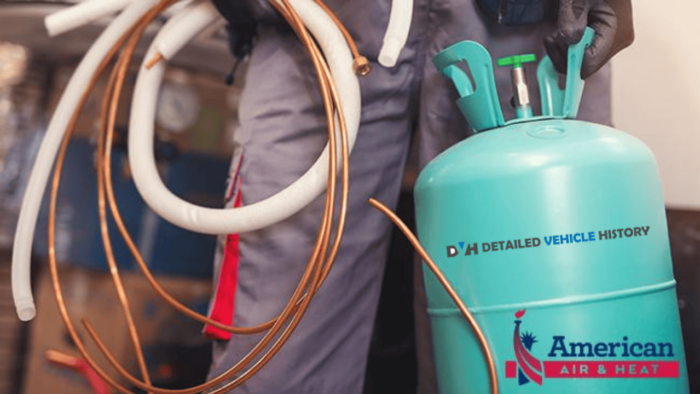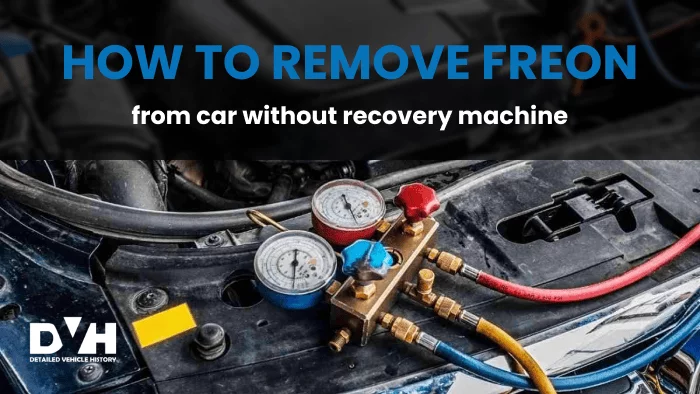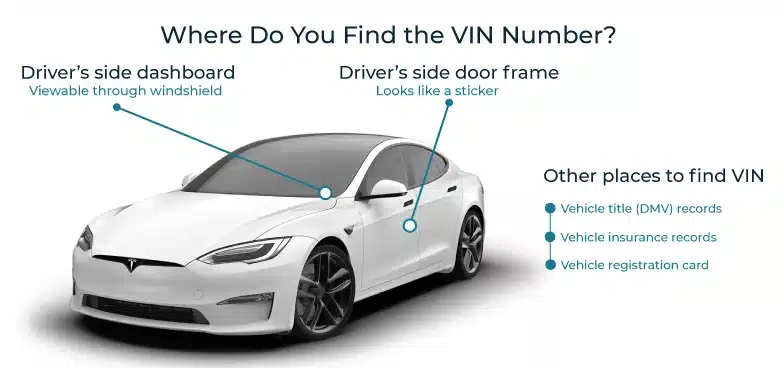Do you want to know how to remove excess freon from car ACs? If you’re facing issues with your car’s air conditioning and suspect that excess freon may be the culprit, it’s crucial to address the problem promptly.
Wondering how to remove freon from car without recovery machine? In this guide, we’ll provide you with step-by-step instructions on how to remove freon from your car safely and effectively.
If you’re buying a used car, checking the service record section of the vehicle history report can reveal if the car’s AC system and other parts have been repaired in the past. This can influence your decision whether to go ahead with the purchase or not
Is It Safe to Remove Freon from Car?
Removing freon from your car’s air conditioning (AC) system without a recovery machine is not safe and is generally not recommended. There are several important reasons for this:
- Environmental Impact: Freon, also known as refrigerant R-134a or R-12, is a chlorofluorocarbon (CFC) or hydrochlorofluorocarbon (HCFC) compound. These substances are harmful to the environment, particularly the ozone layer. Releasing freon into the atmosphere can contribute to ozone depletion and global warming. It is illegal in many places to vent freon into the air due to these environmental concerns.
- Health Hazards: Freon exposure can be harmful to human health. Inhaling freon fumes can lead to respiratory problems, dizziness, nausea, and other health issues. Safety precautions, such as wearing gloves and safety goggles, are necessary when working with freon.
- Lack of Equipment: Recovery machines and equipment are designed to safely capture and store freon during the removal process. Attempting to remove freon without the proper equipment can result in leaks, spills, and uncontrolled releases, which are hazardous to both the environment and your health.
- Ineffective Removal: Removing freon without a recovery machine is a slow and challenging process. It may not effectively remove all the freon from the system, leaving residual amounts behind. This can lead to future AC system issues and potentially costly repairs.
- Legal Issues: In many jurisdictions, it is illegal to release freon into the atmosphere. Engaging in such practices can result in legal consequences, fines, or penalties.
To ensure the safe and responsible removal of freon from your car’s AC system, it is strongly recommended to consult a professional technician or a certified HVAC specialist. They have the necessary equipment, knowledge, and training to perform freon removal in compliance with environmental regulations and safety standards.
This not only protects the environment and your health but also ensures the proper functioning of your vehicle’s AC system.
Tools Needed to Remove Freon From Your Car
To remove freon from car without using the recovery machine, you’ll need these materials:
- – Safety goggles and gloves
- – Wrenches and pliers
- – A service hose with a low-loss fitting
- – A container to capture the freon
- – An approved freon recovery and recycling service (for proper disposal

How to Safely Remove Freon from Your Car: Step-by-Step Guide
Here are the steps on how to safely remove freon from car without recovery machine. Remember that this should only be done when no other option is available, and always with strict adherence to safety measures and environmental considerations
- Safety First: Always prioritize your safety when handling refrigerants. Begin by wearing safety goggles and gloves to protect yourself from potential exposure to freon.
- Locate the Service Ports: Your car’s air conditioning system has two service ports, namely the low-pressure and high-pressure ports. To find their precise positions, consult your vehicle’s manual. These ports are essential for accessing the AC system.
- Prepare the Hose: Next, get your service hose ready. Ensure it has a low-loss fitting that can create a secure connection with the service port. This tight seal is crucial for the freon removal process.
- Drain the System Slowly: Start the process by gently opening the low-pressure service valve on the hose. It’s vital to perform this step with the engine turned off. By doing so, you allow freon to escape gradually from the AC system into your designated container.
- Monitor Pressure: As the freon drains from the AC system, keep a close eye on the pressure gauge attached to the hose. This gauge serves as your indicator of progress. As freon is removed, the pressure inside the system will steadily decrease.
- Be Patient: Removing freon from a car without specialized equipment is not a fast procedure. It requires patience, as it may take a considerable amount of time for all the freon to escape. Continue to monitor the pressure gauge to ensure it is consistently decreasing.
- Close the Valve: Once the pressure gauge confirms that there is no more freon left in the system, promptly close the low-pressure valve on the hose. This step ensures that no additional freon escapes from the AC system.
- Dispose of the Captured Freon Properly: Proper disposal of the captured freon is of utmost importance. Under no circumstances should you release it into the atmosphere, as this practice is harmful to the environment and may be illegal. To ensure compliance with environmental regulations, contact an approved freon recovery and recycling service in your area. They possess the necessary expertise and equipment to handle the safe and legal disposal of freon.
Following these steps will help you carry out the process easily. However, it’s essential to keep in mind the legal and environmental considerations associated with freon disposal, and seeking professional assistance is strongly recommended.
Conclusion
Removing Freon without a recovery machine is risky and often not recommended. Always follow safety rules or get help from a professional. If you’re buying a used car, it’s smart to check the vehicle history. A full report can reveal past air conditioning repairs, accidents, or other hidden issues, helping you make a safer and smarter decision.
Frequently Asked Questions
Can You Remove Freon From a Car Without a Recovery Machine?
Yes, it is possible to remove freon from a car’s AC system without a recovery machine, but it’s important to note that this method should only be considered when there are no other alternatives.
It’s recommended to consult a professional technician for safe and environmentally responsible freon removal. If you decide to proceed, follow the steps outlined in this guide with caution.
How Do I Remove Excess Freon from My Car AC at Home?
To remove excess freon from your car AC at home, you can follow the steps provided in this guide for freon removal without a recovery machine. Ensure you prioritize safety and environmental considerations throughout the process.
How Much Does It Cost to Remove Freon from a Car?
Typically, professional freon removal services may range from $100 to $300 or more. The cost can vary depending on several factors, including your location, the complexity of the task, and whether you hire a professional technician.
Is It Legal to Remove Freon From a Car Without a Recovery Machine?
The legality of removing freon from a car without a recovery machine varies by location and is subject to environmental regulations. In many places, it is illegal to release freon from a car into the atmosphere due to environmental concerns. Always check local laws and regulations regarding freon handling and disposal.










